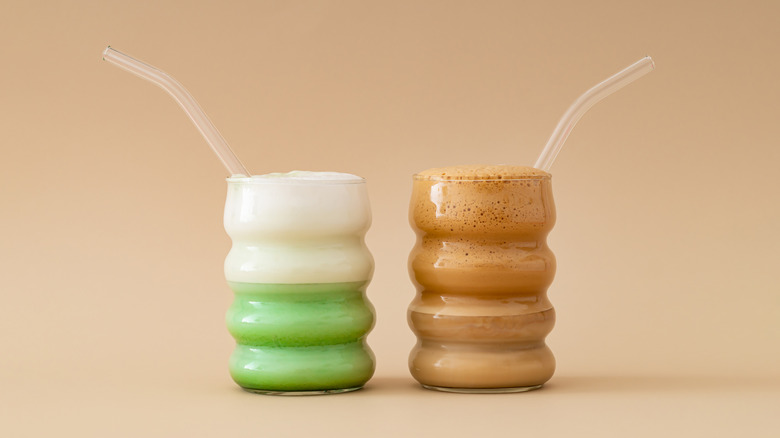How Much Caffeine Is In Matcha And Is It More Than Coffee?
With a history spanning over 1,000 years, matcha is nothing new. But over in the U.S., it has only recently skyrocketed in popularity to become a coffee-house staple. But when it comes to morning pick-me-ups, how does matcha fare against coffee? While the iconic green drink does contain caffeine — and many fans swear by its energy-boosting properties — a standard cup usually (but not always) contains less caffeine per serving than a cup of java.
Matcha is a finely ground powder made from green tea leaves. But unlike brewed tea, matcha has a much more pronounced, concentrated flavor and is higher in both caffeine and antioxidants. One cup of green tea contains just 29.4 milligrams of caffeine, whereas a single gram of matcha powder contains around 19 to 44 milligrams. The production process can also affect how much caffeine the matcha contains. For instance, high-quality, ceremonial-grade matcha that is shaded for longer and harvested earlier in the season will contain more caffeine than lower-quality varieties.
Ultimately, how much caffeine you get from either drink depends largely on serving size. While matcha is very caffeine-dense, a typical serving is only 1 to 2 grams, whereas an 8-ounce cup of brewed coffee contains around 95 to 200 milligrams of caffeine, which can vary based on its type of bean. But stronger preparations of matcha — such as Koicha (commonly used to balance out milk in lattes) — can contain up to 4 grams of matcha, surpassing the caffeine in a single-shot espresso.
More differences between matcha and coffee
The main similarity between matcha and coffee is that they both contain caffeine and are commonly sold at the same establishments. One lesser-known difference between the two popular drinks is the way in which the caffeine expresses itself. That's because matcha contains a variety of beneficial nutrients, including an amino acid called L-theanine, which has been reported to moderate the excitatory properties of caffeine (aka those restless jitters).
The effect of L-theanine on matcha is a gradual caffeine slope that promotes sustained alertness and calm focus. In contrast, a cup of coffee contains no L-theanine, and its caffeine effect is a sharp peak rather than a gradual slope — and can be accompanied by a crash as the stimulatory effects of the caffeine wear off. This makes a fruity matcha latte a great alternative for those looking for an energy boost without the shaky feeling or the midday slump.
Another difference between coffee and matcha is their decaf offerings. Decaf coffee, while not entirely devoid of caffeine, is widely available and comes in countless different blends, many of which are considered to be equal to caffeinated coffee in terms of taste and texture. In comparison, while decaf matcha offerings are available, it's a much smaller market, and reviewers have noted that it isn't as vibrant or flavorful as standard matcha. As a result, those seeking a low-caffeine option for their morning beverage or late-night treat will have more luck finding a coffee alternative — like a comforting golden milk latte — rather than a matcha one.


